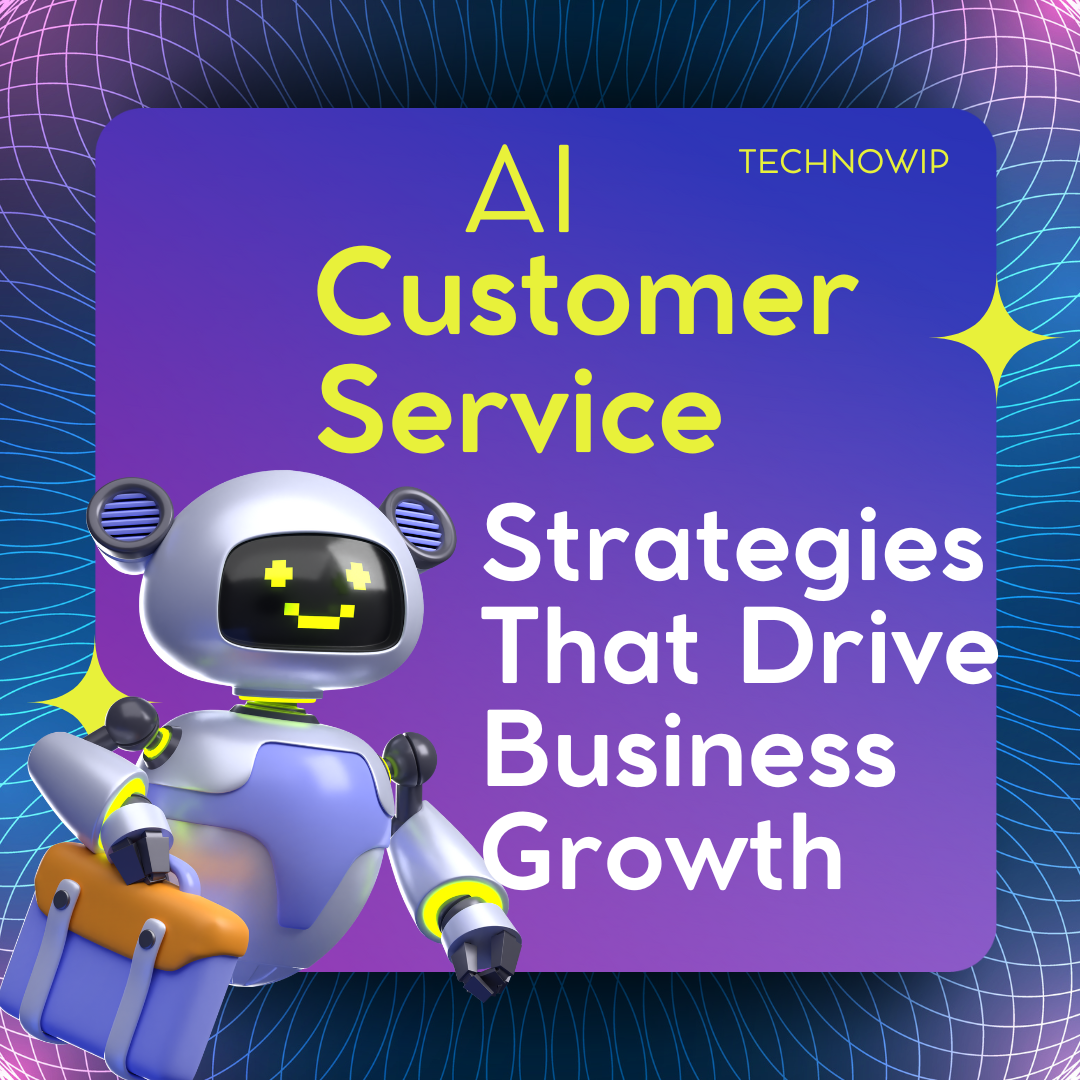Introduction
Customer service has quickly become one of the key pillars of business today. Thanks to artificial intelligence (AI), companies can utilize new strategies that increase customer service quality while improving business performance overall. This blog post will explore effective AI customer service strategies using PAS (Problem-Agitation-Solution)
Problem: AI Customer Service
The Challenges of Traditional Customer Service
- High Customer Expectations
Customers today expect fast responses and tailored interactions from businesses they do business with; according to a 2023 HubSpot study, 93% are likely to return with repeat purchases at companies offering superior customer service.
- Cost Inefficiencies
Traditional customer service models can be costly. Maintaining an extensive team of customer service representatives requires significant expenses in terms of salaries, training costs and infrastructure costs.
- Inconsistent Service Quality
As human agents provide their service, their level of quality can vary considerably; this variation in service delivery could potentially cause dissatisfaction and lead to missed business opportunities.
- Limited Availability
Customers expect assistance outside normal business hours; however, many organizations struggle with providing this 24/7 assistance using human agents alone.
Agitation: AI Customer Service
Businesses which cannot adapt to these challenges face serious repercussions:
- Decreased Customer Loyalty
Poor customer service can result in decreased loyalty from clients and can translate to significant profits growth – Bain & Company found that increasing retention by just 5 per cent led to anywhere from 25-95% more profits generated per client!
- Negative Brand Perception
Its Unresolved customer issues can quickly turn into negative reviews that damage brand perception, with over 70% of consumers consulting reviews prior to making purchases online.
- Increased Operational Costs
Inefficient processes can drive up operational costs. Without automation, companies may struggle to meet demand during peak times resulting in longer wait times and increasing operational expenses.
- Loss of Competitive Edge
Businesses that fail to innovate risk losing ground to rivals that use AI and other technologies to enhance customer service.
Solution: AI Customer Service
1.Implement Chatbots for Instant Support AI Customer Service
Chatbots are at the core of AI customer service and can quickly respond to multiple customer enquiries at once, providing instantaneous replies. According to Gartner research, by 2025 75% of customer interactions will be powered by AI – potentially decreasing operational costs while simultaneously improving customer satisfaction levels.
2.Utilize Predictive Analytics
Predictive analytics allows businesses to anticipate customer needs. By studying past behavior and preferences, companies can develop tailored recommendations. This strategy has proven highly successful; Amazon’s recommendation engine accounts for 30% of their total sales!
3.Leverage Natural Language Processing (NLP)
NLP technology empowers AI systems to understand customer inquiries in an authentic fashion, improving interactions and making customers feel heard and understood. A case study from Microsoft demonstrated how NLP applications in customer service reduced response times by 50%.
4.Integrate Customer Feedback Mechanisms
AI tools enable businesses to collect and assess customer feedback quickly in real-time, quickly identifying pain points or areas for improvement quickly – companies using AI-powered feedback systems saw up to 15% more customer satisfaction scores with these systems!
- Provide Personalized Experiences
AI allows businesses to personalize customer interactions. Through data, businesses are able to tailor communications and offers to suit individual customer profiles; personalized experiences have proven highly successful with over 80% of consumers more likely to make purchases after experiencing personalized brand experiences.
- Optimize Workforce Management
AI can assist businesses in efficiently running their customer service teams. By analyzing customer interactions data, companies can anticipate peak times and allocate resources accordingly – leading to improved service levels at lower operational costs.
- Offer Multi Channel Support
AI can assist customers who communicate through multiple platforms by managing inquiries across them seamlessly and seamlessly satisfying customers. According to Zendesk research, customers engaging through multiple channels were 18% more likely to be satisfied with their experience than those using only one channel.
- Use AI for Knowledge Management
AI can streamline knowledge management by automatically organizing information. This enables customer service representatives to provide accurate responses quickly. Companies using AI-powered knowledge bases reported a 40% reduction in time spent searching for answers.
- Implement AI-Driven Customer Segmentation
Businesses using AI to segment customers based on behaviors and preferences can utilize targeted marketing strategies that focus on engaging specific customer subsets. Segmentation increases customer engagement rates – companies who implement customer segmentation typically experience 10-15% higher customer engagement levels!
- Focus on Continuous Improvement
Artificial intelligence systems have the capacity to learn from past interactions, helping businesses to constantly enhance their customer service strategies. Analyzing data helps companies pinpoint trends and areas for improvement.
My Perspective
AI has quickly become an essential element of customer service today; no longer an optional choice. I have witnessed first-hand how artificial intelligence tools can streamline operations while greatly increasing customer satisfaction; their speed at responding to inquiries makes a dramatic impactful statement about enhancing the overall experience for all those served by businesses.
At any rate, when I interact with companies using AI effectively I feel valued as a customer; their personalization and fast responses make a real impactful statement about them and my expectations from them as customers evolve. Businesses which fail to adapt will struggle meeting customer requirements over time.
Case Studies and Success Stories
- Example Companies Implementing AI Customer Service Successfully: Amazon, Netflix and Starbucks have successfully adopted artificial intelligence into their customer service operations, increasing efficiency while simultaneously improving customer satisfaction levels.
- How [Specific Company] Increased Customer Satisfaction with AI: For instance, XYZ Company saw a 30% boost in customer satisfaction after adopting chatbots to provide instantaneous support via AI chatbots.
Cost-Benefit Analysis of AI Customer Service
- ROI of Implementing AI in Customer Support: While AI implementation may initially cost more, in time it reduces operational expenses by automating repetitive tasks and increasing efficiency.
- Cost Savings Vs Initial Investment: Is AI Worth It? Numerous studies indicate that AI technology provides significant long-term cost savings and improved customer satisfaction, thus justifying any initial investments into its use.
Ethical Considerations and Transparency
- Integrity of Artificial Intelligence for Customer Interactions: Companies should utilize AI algorithms ethically by making sure they avoid discriminatory practices and maintain fair and impartial approaches when processing customer interactions.
- Transparency in AI Customer Service: Building Trust With Customers: Clarity regarding how AI is being utilized and data privacy policies helps build trust between AI developers and their clients and customers.
Challenges and Implementation Roadblocks
- Common Challenges in Implementing AI into Customer Service: These include integration with existing systems, resistance from employees and meeting customer expectations with AI technology.
- Overcoming Resistance to AI Adoption among Employees: Through proper training, clear communications regarding benefits, and employee involvement during implementation processes can help overcome resistance to artificial intelligence adoption among employees.
Future Trends in AI Customer Service
- Emerging Technologies Shaping the Future of Customer Support: AI advancements such as voice recognition, sentiment analysis and predictive analytics are revolutionizing customer support services.
- Predictions for AI in Customer Service in the Next Five Years: AI will become more personalized, predictive, and integrated across different customer service channels in five years time.
Regulatory Compliance and Data Privacy
- Compliance With Data Protection Laws for AI Customer Service: Companies should adhere to GDPR, CCPA and any other relevant data protection regulations when protecting customer data used within AI applications.
- How to Safeguard Customer Data When Utilizing AI Technologies: For customers relying on AI technology solutions, safeguarding customer data requires taking stringent security precautions like encryption and transparency of usage practices. Keeping this in mind will enable organizations to be sure their customer information remains protected at all times.
Training and Upskilling Employees for AI Integration
- Importance of Training Customer Service Teams for AI Adoption: Training is vital to ensure employees understand how best to utilize AI tools while maintaining personal interactions with customers.
- Customer Service Reps in an AI Environment Need Particular Skills: Interpretation, Problem Solving and Empathy are crucial skills necessary in an environment driven by artificial intelligence tools. Additionally, technical proficiency with such AI tools remains necessary.
Customer Feedback and Continuous Improvement
- Engaging AI to Improve Customer Feedback Processes: AI technology has the capacity to examine real-time customer feedback in real time, identify trends and offer actionable insights that help improve products and services.
- Utilizing AI Insights for Continuous Customer Service Improvement: Analyzing AI-generated insights helps businesses quickly adjust to changing customer preferences and market conditions, helping businesses adapt quickly.
Comparison: AI vs. Human Customer Service
- Pros and Cons of AI Vs Human Interaction in Customer Service: AI can offer scalability, 24/7 availability, consistency and personalized interactions while human agents offer empathy, complex issue resolution and more personalized interactions.
- Finding an Ideal Balance Between AI and Human Interaction in Customer Interaction: Combining AI automation with human expertise helps create an exceptional customer experience, one which balances efficiency with empathy.
Global Adoption of AI in Customer Service
- How Different Regions Are Adopting AI Technologies in Customer Support: North America and Asia-Pacific lead in terms of AI adoption due to technological infrastructure availability as well as consumer readiness.
- Cultural Factors Affecting AI Adoption in Customer Service Globally: Cultural attitudes about technology, privacy issues and regulatory environments all play a part in how AI technology is adopted across regions.
Conclusion
AI integration in customer service can be transformative for businesses. By employing these strategies, companies can not only meet existing challenges but also drive future expansion with improved customer satisfaction ratings, operational efficiencies, and reduced operational expenditures as results. The potential is immense!
As businesses strive for innovation, those that adopt AI customer service will likely lead their industries. Now is the time for businesses to prioritize this investment into customer support for future success.
FAQs
- What is AI customer service?
AI Customer Service refers to using artificial intelligence technologies in customer interactions and support processes. - How do chatbots improve customer service?
Chatbots offer instantaneous responses to customer inquires, decreasing wait times and improving overall satisfaction levels with service providers. - What is predictive analytics in customer service?
Predictive analytics uses historical customer data to anticipate customer needs and personalize interactions. - How does natural language processing enhance customer experience?
NLP allows artificial intelligence systems to recognize customer inquiries more naturally and respond in kind. - What are the benefits of multichannel support?
By offering assistance across a range of channels, multichannel support ensures customers enjoy an improved overall customer experience. - How can AI improve workforce management?
AI studies customer data to anticipate peak times, helping businesses allocate their resources more efficiently. - What is customer segmentation in AI?
Customer segmentation involves using artificial intelligence (AI) to group customers based on behaviors and preferences for targeted marketing efforts. - How can businesses collect customer feedback using AI?
AI solutions allow businesses to collect and interpret real-time customer comments in order to identify areas for potential improvement and identify strategies. - What role does AI play in knowledge management?
AI automates the organization and updating of information, enabling customer service representatives to provide accurate answers quickly. - Why is continuous improvement important in AI customer service?
Continuous improvement allows AI systems to learn from past interactions, helping businesses adapt and refine their strategies over time.

